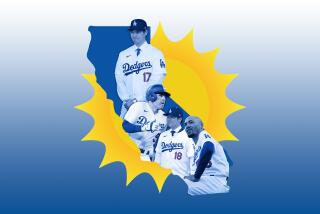Wild Card Isn’t End of World
- Share via
The baseball purists are getting cranky again, now that they’ve noticed there’s a month to go in this season and five of the six divisional races are runaways, give or take the American League West--which is precisely the Angels’ dilemma at the moment.
Cleveland, up in the AL Central by 20 1/2 games.
Boston, in front of the AL East by 15 games.
Cincinnati and Atlanta, both hovering 14 or 15 games above the pack in the NL Central and East.
Four foregone conclusions, plus the pseudo-suspense of the NL West, where the Colorado Rockies are contenders only because the Dodgers push the self-destruct button every other day. The AL West wasn’t anything to watch, either, until the Angels began losing shortstops like pop-ups in the sun. Now, the auto-wreck aficionados are starting to line up on the freeway overpass, to see if Marcel Lachemann can steer this thing home on three wheels.
“The Death of the Great American Baseball Pennant Race” is a theme garnering far too much space and air time lately. It’s a simplistic theme: Three divisions bad, wild card worse. In fact, if you believe everything you read, the wild card is the root of all evils currently vexing the sport. Four-hour games, the demise of The Baseball Network, bloop home runs at Coors Field, ninth-inning forfeits at Dodger Stadium, “Y.M.C.A.” sing-alongs at Anaheim Stadium--it’s all the fault of the wild card.
The truth is, almost nothing about major league baseball is “pure” anymore.
The pastoral game is played on plastic grass under a Fiberglas ceiling.
In one league, cleanup hitters don’t have to play in the field.
In both leagues, pitchers with 4.50 earned-run averages are known as “staff aces.”
Nouveau-retro stadiums dot the landscape, creating the look and feel of 1947 with all the history of the past 18 months.
Because of the anti-gravity chamber the Rockies call home, Vinny Castilla has more home runs than Barry Bonds and Dante Bichette chases the triple crown.
Against this backdrop, a wild-card format for baseball is “artificial”?
Under pre-1994 regulations--back when each league had two divisions and men were men--the playoff derbies of 1995 would look like this:
AL West: Angels eight games ahead of Texas, 9 1/2 ahead of Seattle and 10 1/2 ahead of Kansas City.
AL East: Cleveland 7 1/2 games ahead of Boston, 19 1/2 ahead of Milwaukee and 23 1/2 ahead of Baltimore and New York.
NL West: Atlanta a game ahead of Cincinnati.
NL East: Philadelphia 2 1/2 games ahead of Chicago and 4 1/2 ahead of Montreal.
Status quo in the AL West, mellow drama in the AL East and a couple hot races in the National League.
That’s the surface view, at any rate.
However, as was the case in 1993, when San Francisco won more than 100 games and sat out the postseason, only one of the two-best teams in the National League would qualify for the playoffs under the old format. Atlanta or Cincinnati--one team playing better than .630 baseball would be staying at home while a barely .500 Philadelphia club would be playoff-bound. Or if not the Phillies, how about the sub-.500 Cubs or Expos?
The wild card ensures that the best teams do make the tournament, even if it allows an occasional impostor into the mix. If the season ended tomorrow--and don’t the Angels wish?--the Reds, Braves, Indians, Red Sox and Angels would all be in the playoffs. That’s the Major League Top 5 for 1995, and every name on the list belongs.
Without the wild card, Milwaukee would be singing the small-market blues, its Brewers almost 20 games out, instead of scoreboard-watching and cheering at the news that wild-card rival Texas has lost.
Without the wild card, the Yankees and the Orioles would have already fired their managers, instead of entering the last week of August still within five games of a playoff spot.
Without the wild card, what on earth would Seattle be doing to pass the time now? Applying cold compresses to ward off the ravages of Seahawk fever?
The wild card has actually increased interest in major league baseball. Find another development during the Bud Selig era that can make the same claim.
It has given hope to the Rangers and the Astros of the world and lent some complexity to the Angels’ bid. The wild card is the safety net the Angels never had in 1989--this year, they can blow the lead and still make the playoffs--and yet it is making life tougher for them now. With the playoffs still a possibility in New York and Baltimore, the Yankees and Orioles won’t roll over for the Angels on this trip, as Tuesday’s result from Yankee Stadium most emphatically proved.
“It’ll be more of a grind,” Angel third baseman Tony Phillips assessed before flying east, “but that’s good. It’ll make for better baseball. That’s why the wild card is good for the game.”
The players like it, the average fans like it. And the purists? Well, they’ll always have 1951.
More to Read
Go beyond the scoreboard
Get the latest on L.A.'s teams in the daily Sports Report newsletter.
You may occasionally receive promotional content from the Los Angeles Times.






